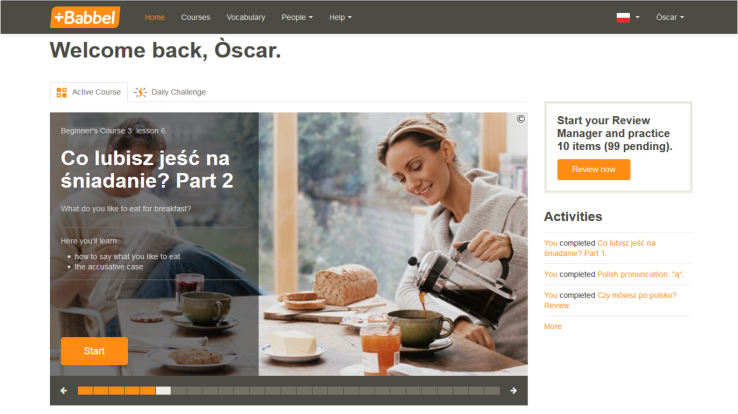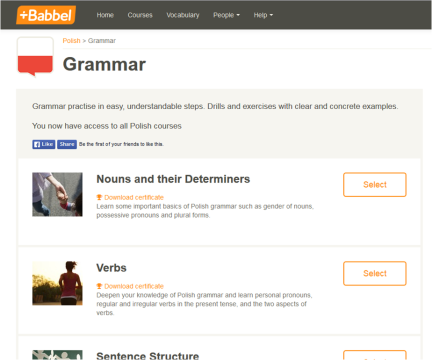When I wrote about how I got my survival level in Polish, I mentioned the Babbel site to learn languages and promised to post an extended review that’s available now.
Babbel is a tool for learning up to 14 languages online (and on mobile devices)—but you might not want to go for all at the same time. It’s also my main tool for learning Polish and I survived in Poland with monolingual Poles, so it must be good. Let’s have a look.
Right after logging in, there’s the home page with the activities of the day and a menu bar at the top. The language of the interface and the lessons can be chosen and even changed, but that may affect the stored vocabulary.

There’s a warm up activity called Daily Challenge (below the welcome message). Some words are shown with proposed translations and the user has to agree or disagree. It’s simple and boosts your self-esteem.
My advice for a second step is to review vocabulary with the Review Manager. In fact, for short sessions that’s my only exercise. All the words, expressions and phrases in the lessons are added to the Review Manager. On the right of the home page there’s a button to review them in groups of 10. The Manager classifies them in 6 levels depending on your performance. Each level has its own frequency of revision: daily for level one, twice a year for level 6. All vocabulary items and their levels can be checked in the Vocabulary section of the menu above.

Courses can be selected in any order from the Courses section of the menu. The basic types are grammar and vocabulary, but there are others. Different languages may have different courses. The selected one will show in the home page with the appropriate lesson on display, but they can be taken in a different order and as many times as the user desires. Grammar lessons tend to start with short explanations with examples and vocabulary ones show the items to study together with a picture and with audio to learn how to pronounce them. Both situations are followed by brief matching or filling-in exercises. After the completion of every course a certificate is awarded—it’s up to the student to decide the real value of it.
Regarding quantity and level of the content, I’d say it’s directly proporcional to the popularity of the language. On the other hand, it’s enough for, at least, the first years of a new language or as a support. Babbel is not a tool for preparing official exams.
Finally, there’s a People section in the menu for interacting with other users, either for linguistic exchanges, group study, simply socializing or even fight for the top 5 scores (climb up the list by reviewing vocabulary and completing lessons).
Babbel is not for free; the quality/price ratio is, nevertheless, more than satisfactory for a committed student. Four subscription options are available from 1 month for 9.95 € to 1 year for 59.40 € (4.95 €/month). I bought and recommend the annual subscription, not only because of its wonderfully ridiculous cost, but also because if you’re not devoting at least 12 months to a language, you should find something else to do.
Were you curious about Babbel, you can take a course for free for each language. Additionally, for having read this far, here’s an invitation for a free week for one language without content limits. However, I don’t know if there’s a limit of invitations, so don’t hesitate. The only thing I’d ask for in return is a comment about your experience and, if you finally subscribe, tell Mr Babbel that I sent you—if I’m lucky, I might get paid a commission.

One thought on “Babbel: learning languages online”